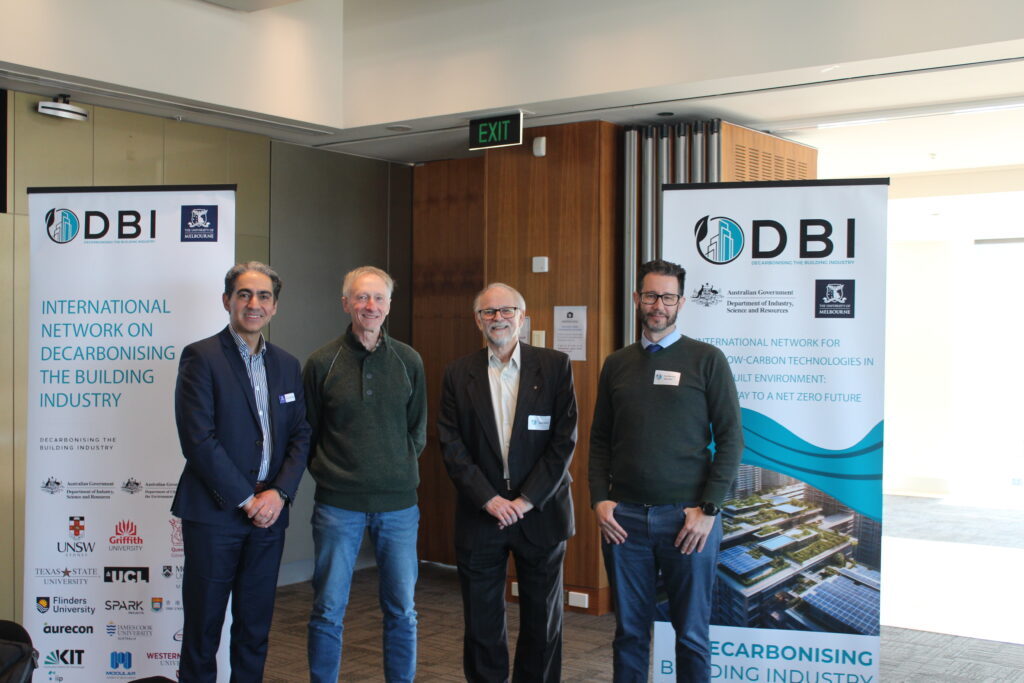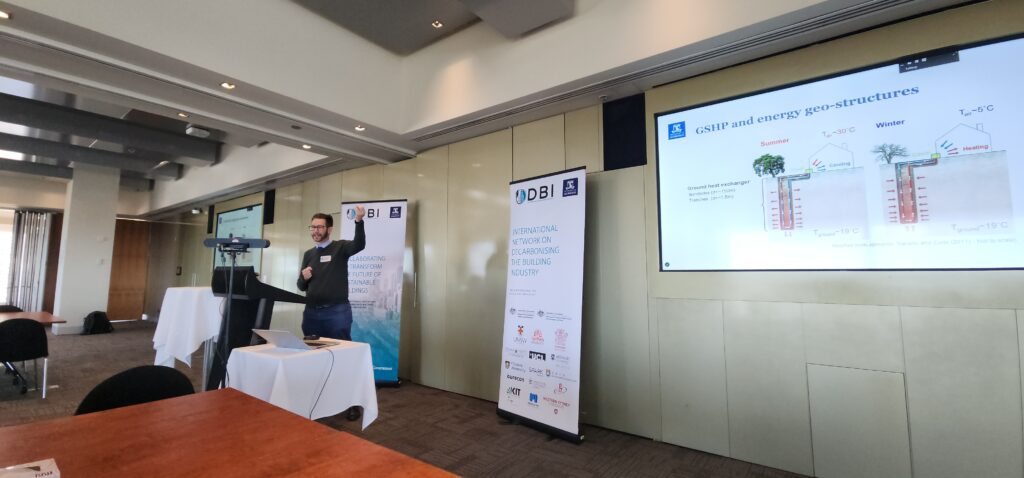On 5 September 2025, the Decarbonising the Building Industry (DBI) network hosted a workshop at the Woodward Conference Centre, University of Melbourne. The event, held in Carlton, Victoria, focused on “Role of energy systems in decarbonising building operation”. In partnership with the University of Melbourne, Egg Geo, and 4EE, it gathered experts from academia, industry, and government to explore geothermal and thermal energy systems, policy challenges, AI applications, and heat pump integration for net-zero buildings. Presenters, such as Dr Graeme Beardsmore, Professor Rachel Webster, Jay Egg, Professor Guillermo Narsilio, and Professor Alan Pears discussed skills for geothermal adoption, policy gaps, and opportunities for accelerating low-carbon energy transitions.

Dr Graeme Beardsmore on the use of groundwater for building heating and cooling in Australia
Dr Graeme Beardsmore, director of the Australian Geothermal Association, discussed groundwater as a medium for heating and cooling buildings. Dr Beardsmore explained how sedimentary basins like Perth’s provide accessible aquifers, with examples from aquatic centres saving significant costs and emissions by replacing gas heating. He highlighted Perth’s leadership, a Gippsland swimming pool system, and potential for district heating in Morwell, emphasising groundwater’s efficiency over air-source heat pumps despite higher upfront costs.
Mr Jay Egg on AI-driven geothermal: a North American perspective on bridging simulation to site
Mr Jay Egg, geothermal consultant from Egg Geo, presented virtually on AI’s role in thermal energy networks (TENs). Mr Egg described TENs as underground utilities sharing heat across buildings, enhancing resilience and security. He showcased AI tools reducing design time from months to hours, optimising networks for urban areas, and achieving 15-30% cost reductions with quick paybacks, urging workforce training and collaboration.
Professor Rachel Webster on policies and regulations affecting geothermal development
Professor Rachel Webster from the University of Melbourne addressed regulatory challenges in Victoria and Australia. Professor Webster categorised geothermal regimes – domestic, commercial aquifer extraction, and deep electricity generation – and noted outdated regulations hindering progress. She called for clearer guidelines on aquifer reinjection, recognition of geothermal as renewable, and de-risking for early adopters to unlock Australia’s potential, drawing inspiration from international examples.
Professor Guillermo Narsilio on ground source heat pumps in infrastructure, buildings and energy foundations
Professor Guillermo Narsilio from the University of Melbourne explored ground source heat pumps (GSHPs) integrated with infrastructure like energy piles and retaining walls. Professor Narsilio explained GSHP efficiency over air-source systems, advantages like 24/7 availability, and challenges such as high upfront costs. He shared demonstrations from Melbourne projects, AI-accelerated design tools, and the importance of balanced thermal loads or groundwater flow for performance.
Professor Alan Pears on heat pumps and geothermal/ground source energy - partnership potential
Professor Alan Pears, senior industry fellow at RMIT University and fellow at the University of Melbourne, examined heat pumps’ synergy with geothermal sources. Professor Pears emphasised temperature differentials’ impact on efficiency, geothermal’s role in thermal storage and load smoothing, and broader benefits like reducing heat islands and water use. He highlighted market challenges, innovations like cascading heat pumps, and opportunities in variable electricity pricing for peak demand reduction.
Key takeaways
- Groundwater offers megawatt-scale heating and cooling with cost and emission savings, as seen in Perth and Gippsland.
- Regulations need reform to support aquifer reinjection and recognise geothermal’s renewable status for faster adoption.
- AI enables resilient thermal networks, slashing design times and costs while addressing security and expansion.
- GSHPs integrated with structures provide efficient, hidden systems, enhanced by AI for quick, accurate designs.
- Geothermal-heat pump partnerships boost efficiency, storage, and multi-benefits like water savings and peak management.

The presentations at the DBI energy workshop showcased the transformative potential of geothermal and thermal energy systems in decarbonising building operations. Experts from diverse backgrounds illuminated practical applications, such as groundwater systems saving costs and emissions in Perth and Gippsland, alongside innovative district heating prospects in Morwell. Regulatory insights revealed the urgent need for policy reform to support aquifer reinjection and recognise geothermal’s renewable credentials, drawing inspiration from global leaders. AI’s role emerged as a game-changer, with thermal energy networks offering resilient, secure designs optimised rapidly for urban settings, supported by case studies demonstrating significant time and cost savings. Ground source heat pumps integrated with infrastructure presented efficient, hidden solutions, enhanced by AI-driven tools, while heat pump-geothermal partnerships promised efficiency gains, thermal storage, and broader environmental benefits. This comprehensive exploration provided actionable pathways toward net-zero buildings, reinforced by the event’s collaborative spirit and setting the stage for future low-carbon advancements.

